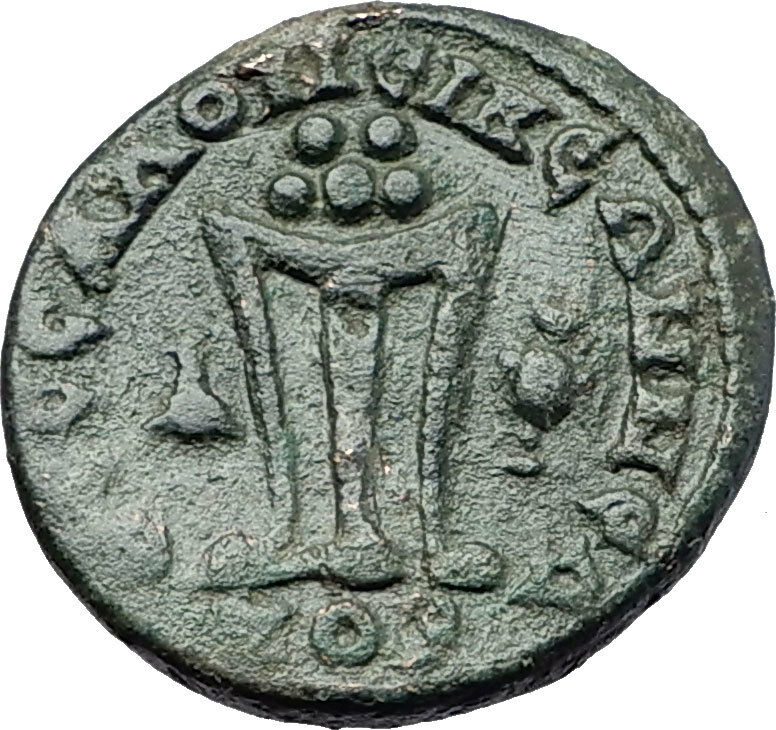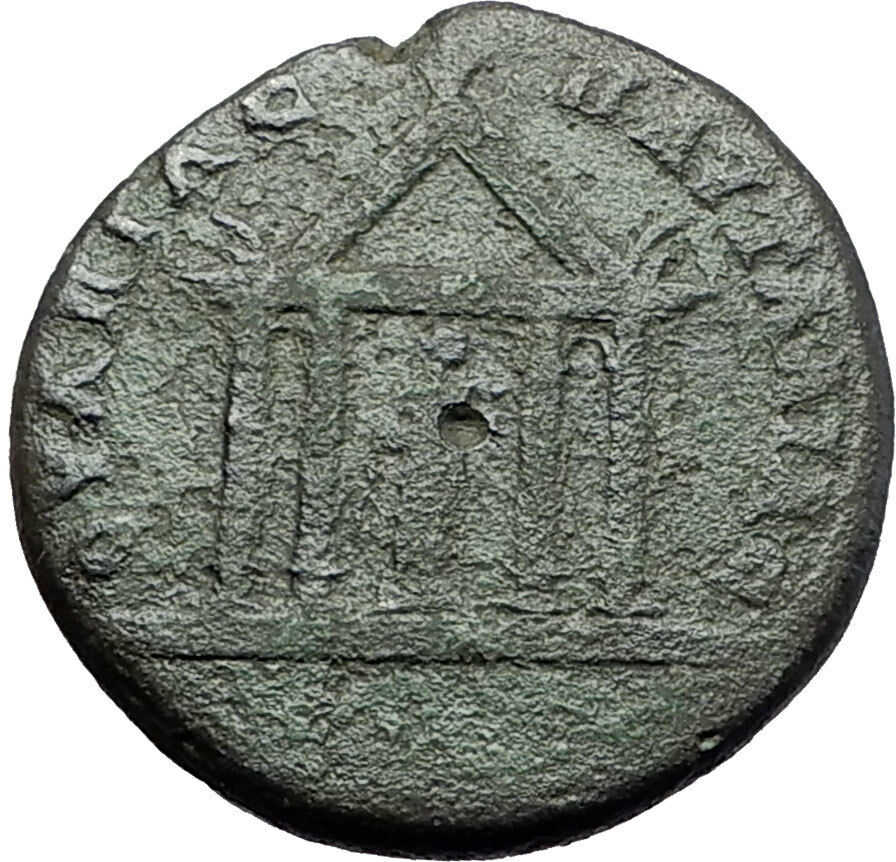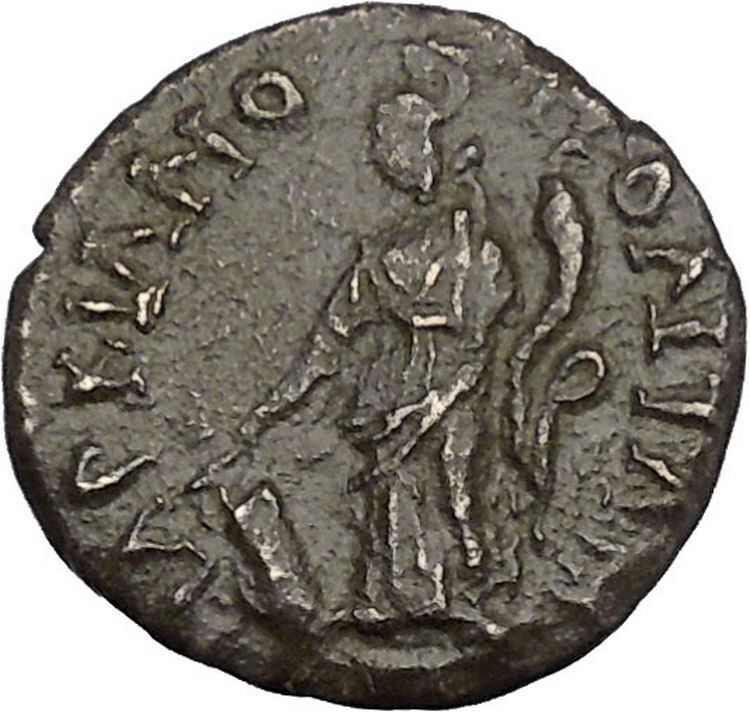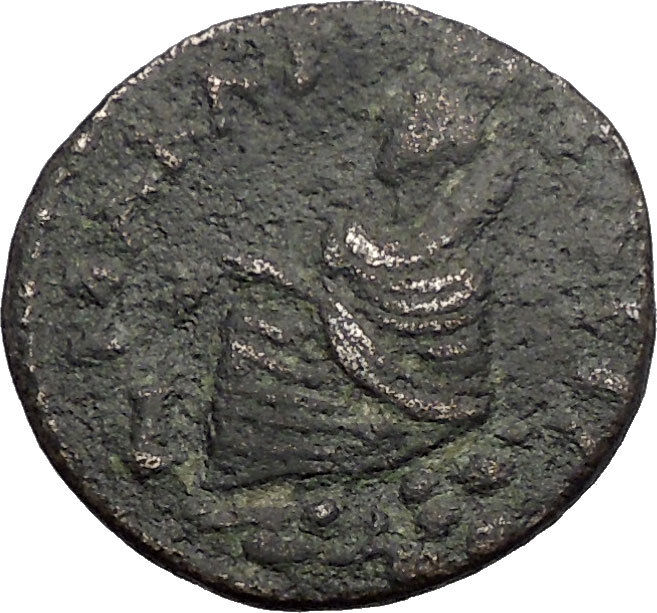|
Tiberius – Roman Emperor: 14-37 A.D.
Tiberius with Germanicus and Drusus
Bronze As 27mm (10.77 grams) of Colonia Romula (Seville), Spain
Reference: RPC 74; Burgos (1992) 1588
Certification: NGC Ancients 4375823-003
PERM DIVI AVG COL ROM, laureate head of Tiberius left.
GERMANICVS CAESAR DRVSVS CAESAR, confronted heads of Germanicus & Drusus.
You are bidding on the exact item pictured, provided with a Certificate of Authenticity and Lifetime Guarantee of Authenticity.
Germanicus Julius Caesar (24 May 16 B.C. or 15 B.C. – 10 October A.D. 19), commonly known as Germanicus, was a member of the Julio-Claudian dynasty and a prominent general of the early Roman Empire. He was born in Lugdunum, Gaul, and was named either Nero Claudius Drusus after his father or Tiberius Claudius Nero after his uncle. He received the agnomen Germanicus in 9 BC, when it was posthumously awarded to his father in honour of his victories in Germania.
Germanicus was the grandson-in-law and great-nephew of the Emperor Augustus, nephew and adoptive son of the Emperor Tiberius, father of the Emperor Caligula, brother of the Emperor Claudius, and the maternal grandfather of the Emperor Nero.
_01.jpg/200px-Drusus_minor_(Museo_del_Prado)_01.jpg) Nero Claudius Drusus, later Drusus Julius Caesar (his adoptive name) (13 BC-September 14, 23), was the only child of Roman Emperor Tiberius and his first wife, Vipsania Agrippina. He was born in 7 October 15 BC or 14 BC with the name Nero Claudius Drusus, and is also known to historians as Drusus II and Drusus Minor. Drusus was named after his paternal uncle the general Nero Claudius Drusus (who is sometimes called Nero Drusus, Drusus I, Drusus Major, or Drusus the Elder), who was Tiberius’ younger brother. He was born and raised in Rome. Drusus was the first grandchild of statesman Marcus Vipsanius Agrippa and his first wife Caecilia Attica. Nero Claudius Drusus, later Drusus Julius Caesar (his adoptive name) (13 BC-September 14, 23), was the only child of Roman Emperor Tiberius and his first wife, Vipsania Agrippina. He was born in 7 October 15 BC or 14 BC with the name Nero Claudius Drusus, and is also known to historians as Drusus II and Drusus Minor. Drusus was named after his paternal uncle the general Nero Claudius Drusus (who is sometimes called Nero Drusus, Drusus I, Drusus Major, or Drusus the Elder), who was Tiberius’ younger brother. He was born and raised in Rome. Drusus was the first grandchild of statesman Marcus Vipsanius Agrippa and his first wife Caecilia Attica.
Despite his violent temper, Drusus showed promise with both military and politics. In 13, he was made a permanent member of the Senate committee Augustus had founded to draw up the Senate’s daily business. However, because Drusus was only related to the Claudian side of the family, rather than both the Julians and Claudians, Augustus forced Tiberius to adopt Germanicus, who was married to Augustus’s granddaughter, as his son and heir, removing Drusus from the succession. In 14, after the death of Augustus, Drusus suppressed a mutiny in Pannonia. In 15 he became a consul. He was also governor of Illyricum from 17 to 20. In 21 he was consul again, significantly with his father Tiberius as his colleague, while in 22 he received tribunicia potestas (tribunician power), a distinction reserved solely for the emperor or his immediate successor.
Drusus married his paternal cousin Livilla in 4. Their daughter Julia was born shortly after. They had twin sons Tiberius Gemellus and Tiberius Claudius Caesar Germanicus II Gemellus in 19, the latter of whom died still an infant in 23. In the same year, Germanicus died, making Drusus the new heir; Germanicus’ wife Agrippina suspected Tiberius of having killed him to allow Drusus to become his heir, but this is unlikely.
Before the birth of the twins, Livilla may already have been in a relationship with Sejanus, Tiberius’ Praetorian Prefect. Moreover Drusus, who was naturally irascible, had once in the course of a casual argument with Sejanus raised his fist and struck him in the face. By 23 it looked as if Drusus, who made no secret of his antipathy towards Sejanus, would succeed Tiberius as emperor. For reasons of self-survival, but also because he may have had designs on the supreme power, Sejanus needed to remove Drusus. Ancient sources (Tacitus, Suetonius, Cassius Dio) concur that with Livilla as his accomplice he poisoned her husband. If Drusus was indeed murdered, then it was done so skillfully that his death in 23 gave rise to no suspicion, having as he did a reputation for heavy drinking. Sejanus then (25) asked for Livilla’s hand in marriage but Tiberius forbade it.
Sejanus fell in 31 (October 18). A few days later (October 26) Sejanus’ former wife Apicata committed suicide, but not before addressing a letter to Tiberius claiming that Drusus had been poisoned, with the complicity of Livilla. Drusus’ cupbearer Lygdus and Livilla’s physician Eudemus were now tortured, and seemed to confirm Apicata’s accusation. By the end of the year Livilla too had perished, supposedly forcibly starved to death by her own mother, Antonia.
Drusus was an avid enthusiast of gladiator fights. In fact, we hear that the sharpest swords were named “Drusian” after him. Drusus is noted to have once come to blows with Sejanus in an argument. An earlier fight with a praetorian guard (possibly Sejanus as well) earned him the ironic nickname “Castor“, after the patron god of the praetorians. He features under this name in the novel I, Claudius by Robert Graves, and in its BBC adaptation (in which he was played by Kevin McNally).
He is associated with the gourmand Apicius. Under Apicius’ influence he disdained a certain vegetable of the cabbage family, earning a reprimand from Tiberius. Drusus is also recorded as using bitter almonds (five or six at a time) as a prophylactic against drunkenness.
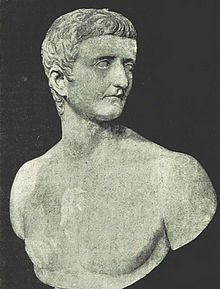
Tiberius – Roman Emperor: 14-37 A.D.
| Son of Livia | Step-son, son-in-law and heir of Augustus | Husband of Vipsania Agrippina and Julia | Brother of Nero Claudius Drusus | Father of Drusus (by Vipsania Agrippina) | Son-in-law of Agrippa | Father-in-law of Livilla | Grandfather of Livia Julia, and (possibly) of Tiberius Gemellus and Germanicus Gemellus | Uncle and Adoptive father of Germanicus, Claudius and Livilla | Adoptive grandfather of Nero Caesar, Drusus Caesar, Caligula, Agrippina Junior, Drusilla and Julia Livilla |
Tiberius Julius Caesar Augustus, born Tiberius Claudius Nero (November 16, 42 BC – March 16, AD 37), was the second Roman Emperor, from the death of Augustus in AD 14 until his own death in 37. Tiberius was by birth a Claudian, son of Tiberius Claudius Nero and Livia Drusilla. His mother divorced his father and was remarried to Octavian Augustus in 39 BC, making him a step-son of Octavian. Tiberius would later marry Augustus’ daughter Julia the Elder (from an earlier marriage) and even later be adopted by Augustus, by which act he officially became a Julian, bearing the name Tiberius Julius Caesar. The subsequent emperors after Tiberius would continue this blended dynasty of both families for the next forty years; historians have named it the Julio-Claudian dynasty.
Tiberius was one of Rome’s greatest generals, whose campaigns in Pannonia, Illyricum, Rhaetia and Germania laid the foundations for the northern frontier. But he came to be remembered as a dark, reclusive, and somber ruler who never really desired to be emperor; Pliny the Elder called him tristissimus hominum, “the gloomiest of men.” After the death of Tiberius’ son Drusus Julius Caesar in 23, the quality of his rule declined and ended in a terror. In 26, Tiberius exiled himself from Rome and left administration largely in the hands of his unscrupulous Praetorian Prefects Lucius Aelius Sejanus and Quintus Naevius Sutorius Macro. Caligula, Tiberius’ adopted grandson, succeeded the Emperor upon his death.
After returning from the East in 19 BC, Tiberius was married to Vipsania Agrippina, the daughter of Augustus’s close friend and greatest general, Marcus Vipsanius Agrippa, appointed praetor, and sent with his legions to assist his brother Drusus in campaigns in the west. While Drusus focused his forces in Gallia Narbonensis and along the German frontier, Tiberius combated the tribes in the Alps and within Transalpine Gaul, conquering Raetia. In 15 BC he discovered the sources of the Danube, and soon afterwards the bend of the middle course. Returning to Rome in 13 BC, Tiberius was appointed as consul, and around this same time his son, Drusus Julius Caesar, was born.
Agrippa’s death in 12 BC elevated Tiberius and Drusus with respect to the succession. At Augustus’ request, Tiberius divorced Vipsania and married Julia the Elder, Augustus’ daughter and Agrippa’s widow. This event seems to have been the breaking point for Tiberius; his marriage with Julia was never a happy one, and produced only a single child which died in infancy. Reportedly, Tiberius once ran into Vipsania again, and proceeded to follow her home crying and begging forgiveness; soon afterwards, Tiberius met with Augustus, and steps were taken to ensure that Tiberius and Vipsania would never meet again. Tiberius continued to be elevated by Augustus, and after Agrippa’s death and his brother Drusus’ death in 9 BC, seemed the clear candidate for succession. As such, in 12 BC he received military commissions in Pannonia and Germania; both areas highly volatile and key to Augustan policy. He returned to Rome and was consul for a second time in 7 BC, and in 6 BC was granted tribunician power (tribunicia potestas) and control in the East, all of which mirrored positions that Agrippa had previously held. However, despite these successes and despite his advancement, Tiberius was not happy.
Lucius Aelius Sejanus had served the imperial family for almost twenty years when he became Praetorian Prefect in AD 15. As Tiberius became more embittered with the position of Princeps, he began to depend more and more upon the limited secretariat left to him by Augustus, and specifically upon Sejanus and the Praetorians. In AD 17 or 18, Tiberius had trimmed the ranks of the Praetorian guard responsible for the defense of the city, and had moved it from encampments outside of the city walls into the city itself, giving Sejanus access to somewhere between 6000 and 9000 troops. The death of Drusus elevated Sejanus, at least in Tiberius’s eyes, who thereafter refers to him as his ‘Socius Laborum’ (Partner in my labours). Tiberius had statues of Sejanus erected throughout the city, and Sejanus became more and more visible as Tiberius began to withdraw from Rome altogether. Finally, with Tiberius’s withdrawal in AD 26, Sejanus was left in charge of the entire state mechanism and the city of Rome.
Sejanus’s position was not quite that of successor; he had requested marriage in AD 25 to Tiberius’s niece, Livilla, though under pressure quickly withdrew the request. While Sejanus’s Praetorians controlled the imperial post, and therefore the information that Tiberius received from Rome and the information Rome received from Tiberius, the presence of Livia seems to have checked his overt power for a time. Her death in AD 29 changed all that. Sejanus began a series of purge trials of Senators and wealthy equestrians in the city of Rome, removing those capable of opposing his power as well as extending the imperial (and his own) treasury. Germanicus’s widow Agrippina the elder and two of her sons, Nero and Drusus were arrested and exiled in AD 30 and later all died in suspicious circumstances.
|









_01.jpg/200px-Drusus_minor_(Museo_del_Prado)_01.jpg) Nero Claudius Drusus, later Drusus Julius Caesar (his adoptive name) (13 BC-September 14, 23), was the only child of Roman Emperor Tiberius and his first wife, Vipsania Agrippina. He was born in 7 October 15 BC or 14 BC with the name Nero Claudius Drusus, and is also known to historians as Drusus II and Drusus Minor. Drusus was named after his paternal uncle the general Nero Claudius Drusus (who is sometimes called Nero Drusus, Drusus I, Drusus Major, or Drusus the Elder), who was Tiberius’ younger brother. He was born and raised in Rome. Drusus was the first grandchild of statesman Marcus Vipsanius Agrippa and his first wife Caecilia Attica.
Nero Claudius Drusus, later Drusus Julius Caesar (his adoptive name) (13 BC-September 14, 23), was the only child of Roman Emperor Tiberius and his first wife, Vipsania Agrippina. He was born in 7 October 15 BC or 14 BC with the name Nero Claudius Drusus, and is also known to historians as Drusus II and Drusus Minor. Drusus was named after his paternal uncle the general Nero Claudius Drusus (who is sometimes called Nero Drusus, Drusus I, Drusus Major, or Drusus the Elder), who was Tiberius’ younger brother. He was born and raised in Rome. Drusus was the first grandchild of statesman Marcus Vipsanius Agrippa and his first wife Caecilia Attica.


